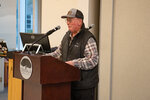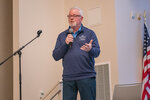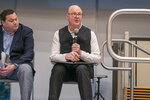






Regardless of who you asked, whether it be the collection of industry experts, educators, local officials, company executives, high school students, business owners or transit officials, just about everyone agreed that a proposed green hydrogen facility at the soon-to-be shuttered TransAlta plant presents a unique opportunity for Lewis County to cement its place in an economy increasingly dependent on green energy.
“The other day when the governor was here, he said to me, ‘Lewis County is a shining example in our region, in our state, in our nation, and in the world,” Lewis County Transit Executive Director Joe Clark said. “How many times have we been in that position? It’s time to lean all in on that position and not worry that we’re off here trying to do something behind a curtain.”
For some, though, questions remain on hydrogen’s viability and the promised benefits that range from new jobs and additional tax revenue to a revitalized and futuristic public school system, and perhaps no moment better symbolized the lingering uncertainty than when a panel at Centralia College on Monday began taking audience questions after nearly an hour and a half of discussion.
The event was hosted by the Economic Alliance of Lewis County.
“You haven’t talked about your project. You haven’t discussed your project, or any details of it… We’ve talked about everything else,” an audience member called out to a representative of Fortescue Energy, the Australia-based company backing the proposed hydrogen facility.
The panel, titled “The Economics of Clean Energy,” was the latest forum in an ongoing debate on how closely Lewis County residents should align themselves to the emerging technology. Panelists for the forum included representatives from Fortescue, the Renewable Hydrogen Alliance, FirstMode, Lewis County Transit and the Center of Excellence for Clean Energy, as well as Lewis County Commissioner Lindsey Pollock.
In her remarks, Centralia Mayor Kelly Smith Johnston said long-term residents “know we’ve taken our hits.”
“We’ve been an impoverished, struggling community for decades. It’s time for us to thrive,” Smith Johnston said.
While the panel touted the economic benefits clean energy could provide, audience members voiced concerns about a proposed hydrogen facility that preliminary estimates show could cost between $400 and $600 million, though final costs are dependent on the project design.
As design and permitting continue, Fortescue’s current timeline projects shovels in the dirt in 2026 and a functional plant in 2026. The “vast majority of the financing will be our money,” according to Robert Cowin, a Fortescue senior manager of Western U.S. government relations.
The facility could have the capacity to store 110 tons of hydrogen at a time, which equates to one day’s worth of production. Cowin said transportation from the facility will “most likely” be done by truck.
“I’m not the guy that’s going to be putting the breaks on one damn capitalist that wants to come here and spend money,” said Bob Russell, a member of the Renewable Task Force.
Russell said part of the discussion was “people being worried about something they don’t understand.”
“We’ve got to move the needle somewhere, and those are the two main sectors, right? Transportation and sustainable aviation fuels,” Russell said. “We’re going to do this stuff, anyways. The money’s here. I'm just marching. I’m getting on board. We know they’re going to do it safely.”
But for Pollock, the conversation on energy is one she’s been involved in “since about the mid-80s.”
“That started with the proposal for a methane digester in the Boistfort Valley. Excellent plan, it just didn’t come to fruition,” Pollock said. “The next major thing that came along was the Cowlitz Falls hydroelectric project. I had a front-row seat to watch that project get dragged through the media, and it was an incredible battle to get it in.”
Before the forum, Pollock used an event at the Baw Faw Grange last week as a platform to voice similar concerns and encourage residents to attend the Centralia College event, saying, “We’re going to need to hear a little bit about what is going on, and then have focused concerns.”
After two hours of conversation and an opportunity to confront representatives from involved parties, Pollock said in an interview with The Chronicle that questions remained.
“How much is it going to cost? How exactly are the tax breaks going to affect us? Why are we doing it as a centralized facility as opposed to distribution?” Pollock asked.
Rumors of layoffs
Adam Day, a senior government affairs manager at First Mode, addressed recent layoffs at the company, which circulated on social media after a purported news site asserted the decision was a sign the company’s hydrogen fuel cell truck project was a failure.
“We’re a relatively young company, and we did just have layoffs,” Day said. “Sometimes as a new company, you grow too quickly, and that’s what happened with us. We had a small reduction in force, about 40 employees locally at our Seattle headquarters, who were laid off. But that doesn't affect any of the employees that we have down here in Centralia.”
No impact on PUD customers
During the forum, Cowin also reiterated Fortescue’s commitment to negating any impact on local utility customers. The assurance comes after Lewis County Public Utility District (PUD) Commissioner Mike Hadaller said last week the PUD “will make sure that whatever Fortescue does, they will pay for themselves and it will come out of their pockets and not out of any of ours.”
“Our project is not going to directly raise electricity prices,” Cowin said. “To the extent that there were any additional costs by serving our facility, we’d expect that those would be passed on directly to us. That’s the way the PUD does business, we committed to that publicly. So I want to be very clear on that because it’s really easy to scare people and tell them their electricity prices are going to go up. And it’s simply not the case.”
‘We’re supposed to be the caretakers of our land’
In one of the final audience questions of the night, the panel heard concerns from a woman who identified herself as an elder in the Cowlitz Tribe who said she has not yet taken a position on hydrogen.
“As a Native American, I do know that big energy comes to tribal places, tribal lands and reservations, and makes all of these promises of great wealth and jobs and this and that,” she said. “And then when the resources are gone, they leave town and go ‘oops, sorry.’”
In an interview, the woman described the panel as an “infomercial.”
“They’re going far ahead and saying, ‘This is what the end product will look like,’ without discussing how to get there. And that’s what I’m interested in.”
In response, Clark said part of the process to receive the hydrogen hub funds is a “community benefits plan” that requires engagement with local tribes “about how they want to do this with us and not we do it to them.”
“Keep an eye on that and make sure if that engagement isn’t at the level or the depth that you want it to be, call us back,” Clark said. “All of us would love to have that conversation, and we do understand some of the things that have gone on in the past.”
Hydrogen hubs
Last October, President Joe Biden announced seven “hydrogen hubs” across the United States as recipients of billions of dollars in grant funding. The Pacific Northwest Hydrogen Hub, the “PNW H2,” will see up to $1 billion, according to the U.S. Department of Energy.
According to the PNW H2, recipients of the funding include Puget Sound Energy, Twin Transit, Centralia College and USA Fortescue Future Industries.
“Today, the president put a stake in the ground. $8 billion is a pretty good number. And it’s amazing that it trickles down to Lewis County like it has,” said Joe Clark, executive director of Twin Transit, a public agency with bus lines and other transportation services in Lewis County, at the time. “This is transformational.”
Fortescue, an Australian mining company, is the parent of the “Future Industries” incorporation. For about two years, the Economic Alliance of Lewis County has facilitated a relationship between the group and TransAlta as Fortescue eyes construction of the $400-$600 million hydrogen plant in Centralia after the steam plant is fully shuttered.
Thanks to a $2.5 million state appropriation secured by Centralia-based Rep. Peter Abbarno, co-chair of the Legislature’s Hydrogen Caucus, Twin Transit is set to create Washington’s first hydrogen fueling station.
In April, Gov. Jay Inslee joined Chehalis and Cowlitz tribal leaders, representatives from the Oregon and Washington departments of commerce, Smith Johnston, Economic Alliance Director Richard DeBolt, and Lewis County Commissioner Sean Swope to celebrate the PNW H2 grant application.